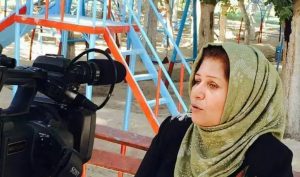We Yearn for Peace

The spike in violence, especially civilian casualties, amid the peace talks, has become a major concern for the public and government alike. Only a political settlement would end this crisis.
Talking to CSHRN, Khadija Yaqin, the Director of Women’s Affairs in Baghlan province, thinks that continuous violence, suicide attacks, assassination, and social crisis will affect the efforts for ending the conflict. According to Ms. Khadija, Afghans have long been yearning for peace, and yet no significant progress has been made in the peace talks.
CSHRN: What how do you see the possible outcome of the peace talks?
Khadija: I am optimistic about the peace efforts; however, the delay in direct talks and the growing increase in violence are concerning. Therefore, the question that comes to mind is what sort of problems exist on the way to peace progress.
CSHRN: How should women make use of peace negotiation efforts?
Khadija: Peace and security will bring about a conducive environment for all people, mainly for women, to build up their capacities and pursue their dreams. The number of female negotiators is not sufficient; and yet, they can advocate increasing their presence in other various political processes.
CSHRN: How will the women’s active presence in negotiations influence the Taliban’s views of women?
Khadija: Women’s presence in important meetings as such, guaranteed by the country’s law will affect the Taliban’s views of women and would be a plausible answer to their opposition. Both women representatives and female journalists, attended on the first days of the meetings, demonstrated women’s freedom provided within the constitutional framework.
CSHRN: Would female negotiators be able to well-represent the wider women community?
Khadija: Although we expected more women to be included in the team, I am personally hopeful about their capacities to defend women’s rights.
CSHRN: Are restrictions on women’s rights acceptable?
Khadija: No restriction on women’s rights will be tolerated. We do not want our constitutional rights and achievements to be compromised during the peace talks. In other words, the peace deal at the expense of women’s rights, and or, restriction of their freedoms will never be welcomed. No society can flourish in the absence of women in public affairs.
CSHRN: How will the presence of the Taliban in power affect women’s freedom and activities?
Khadija: Currently, Afghan negotiators are in discussion with the Taliban to advocate for our social and political rights. Therefore, I want them to explicitly bring those issues to the table and ask the Taliban to adapt to the new environment if the group is willing to reintegrate into the society and political structure.
CSHRN: Apart from the Taliban’s harsh view of women, what else is hindering women’s progress in society?
Khadija: Being a patriarchal society, many mistreatments, including public harassment and traditional customs are practical obstacles on the way to women’s self-actualization.
CSHRN: Tell us about women’s lives in Baghlan province.
Khadija: Women in Baghlan province are facing tremendous problems such as homelessness, illiteracy, violence, and killing. In recent years, two cases of public execution have been recorded in this province.
CSHRN: How do you observe women’s access to education, healthcare services, and employment in this province?
Khadija: There is a professional trade production association, in which around four hundred women are involved. We also hold exhibitions event for women-made products to find markets once in every three months. However, serious challenges have gripped women, including an old-fashioned mindset towards women’s education, lack of schools, poverty, and poor health services. Hopefully, in recent years, things have become easy comparatively.
CSHRN: Would women’s life improve after the peace agreement?
Khadija: We are confident that the government negotiating team, representing the wider Afghan community, will be able to advocate for and protect our constitutional values. They will not compromise our rights, especially those of women.